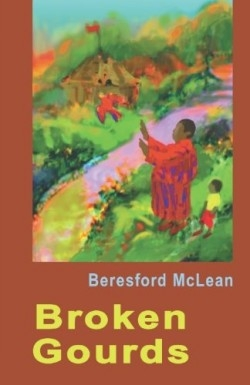Broken Gourds
Take a quick getaway to another time and place merely by opening a book. Billed as “inspirational folklore” Broken Gourds by Beresford McLean transports the reader to Albion a rural Jamaican village in the early 1900s. Sumptuous prose depicts a life where poor black farmers coexist peacefully with rich white town leaders despite the economic divisions.
The main character Dada disrupts Albion’s somnolent complacency. Although Dada’s peers dismiss him as lazy ugly and unskilled the public’s view changes when he receives the supernatural gifts of healing and preaching. Dada now known as Brother Walk grows in fame and power upsetting Albion’s established order. Broken Gourds charts the rise and fall of Brother Walk and how his experiences change his town and himself.
As a native of rural Jamaica who taught in the capital of Kingston before moving to the U.S. author McLean knows the setting of Broken Gourds intimately. His colorful descriptions of the land people customs and buildings use memorable images: “A giant cedar tree towered over the remnants of the building… Its branches spread upwards and out before drooping down over the shell of the old building as if to protect it like an ancient hen gathering her chicks under her wings.” The author’s flowing style and leisurely pace mirror the speed of life in Albion easily drawing the reader into a setting that might otherwise seem exotic.
McLean composes his poetic tale in full consciousness of the power of words. In fact a storyteller features prominently in Broken Gourds in the guise of Brother Walk’s grandmother. Her oral histories captivate everyone in town black and white. Through her gentle lessons she also convinces Brother Walk to accept his healing powers and use them for good. The character of Granny might be analogous to McLean himself. Like Granny the author wishes to use the narrative form to impart lessons about the abuse of power and strength of forgiveness.
Does McLean succeed? Taken as a novel Broken Gourds displays little plot or forward momentum except during the period when Brother Walk’s ministry is catching on. Instead Broken Gourds functions as a series of vivid vignettes united by their common actors and setting but without much character development. For example Granny’s ward Ruth appears fleetingly in the beginning as a rambunctious girl then drops out completely before returning several years later suddenly in love with Brother Walk’s young pupil Twig. Because it lacks continuity of character and a coherent propulsive plot the book will not satisfy a reader expecting a traditional novel.
Broken Gourds has much to offer for readers who enjoy experimental forms and exotic people and places. It is also highly recommended for those who are interested in Jamaica the post-colonial experience New World varieties of Christianity and folklore in general.
Reviewed by
Elizabeth Allen
Disclosure: This article is not an endorsement, but a review. The publisher of this book provided free copies of the book and paid a small fee to have their book reviewed by a professional reviewer. Foreword Reviews and Clarion Reviews make no guarantee that the publisher will receive a positive review. Foreword Magazine, Inc. is disclosing this in accordance with the Federal Trade Commission’s 16 CFR, Part 255.

